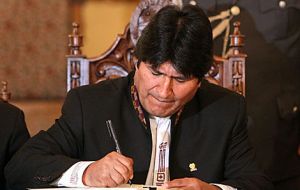MercoPress. South Atlantic News Agency
Bolivia signs gas exploration agreements with Petrobras and Repsol
 President Evo Morales take over policy resulted in a plunge in investments
President Evo Morales take over policy resulted in a plunge in investments Bolivia's state-owned oil company YPF Bolivianos said this week that it has signed oil and gas exploration agreements with Brazil's Petrobras and Spain's Repsol.
The two companies will explore six areas in Bolivia's southern Tarija region where most of the country's gas is produced, said YPF Bolivianos, according to a report on the website of the government's official news agency, ABI.
Petrobras will carry out exploration work in the Astillero and Sunchal areas, both in a producing zone, and in the frontier area of San Telmo, YPF Bolivianos said. Repsol has agreed to explore the Capiguazuti and Rio Saldo areas, both in a producing zone, and in the frontier area of Yuchan.
YPF Bolivianos did not give details on spending, seismic or drilling requirement of the accords. Petrobras and Repsol.
Bolivia has an estimated 710 billion cubic meters of gas, the second largest natural gas reserves in South America after Venezuela.
Since taking control of YPF Bolivianos in 2006, the government of President Evo Morales has required YPF, Petrobras, Total and other companies in the country to conduct new exploration work as a condition of their gas production licenses.
Since 2006, gas investment in Bolivia has plunged, resulting in shortages. The government cut subsidies on natural gas in December, resulting in a 78% surge in prices and widespread protests.
Brazil and Argentina are the two main markets for Bolivian natural gas. Petrobras has the right to import up to 31 million cu m/d of natural gas into Brazil and Argentina has the right to import 7 million cu m/d.
Both countries regularly import far less, and Brazil, which gets up to half its natural gas from Bolivia, has moved since 2006 to secure alternate sources of supply using liquefied natural gas terminals.




Top Comments
Disclaimer & comment rules-

Read all commentsIs anybody keeping an eye on just how much of South American/Latin American oil exploration/extraction/processing/sales is gravitating to Chinese ´partnership´ arrangements.
Mar 09th, 2011 - 10:14 pm 0I see the time when *all* oil-related activities will have a Chinese ´partner´, and all activities will need Chinese permission to operate within the SA state´s own lands.
Don´t laugh - Malaysia has had to come to terms with this, and China has learned how to do it.
Commenting for this story is now closed.
If you have a Facebook account, become a fan and comment on our Facebook Page!